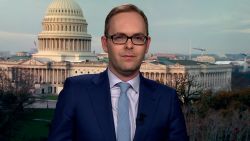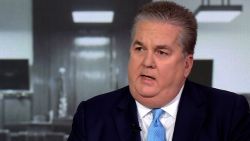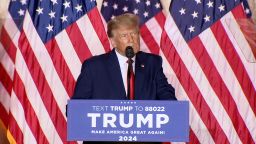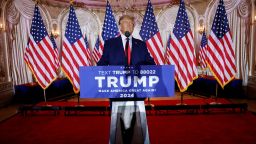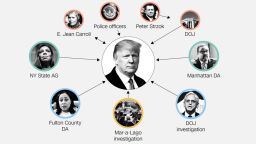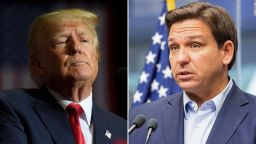It’s American carnage, round three.
Ex-President Donald Trump on Tuesday dragged Americans back into his dystopian worldview of a failing nation scarred by crime-ridden cities turned into “cesspools of blood,” and swamped by immigrants. He added a scary new twist at a time of global tensions, claiming the country was on the verge of tumbling into nuclear war.
Launching his bid for a third consecutive Republican presidential nomination, Trump conversely painted his own turbulent single term, which ended in his attempt to destroy democracy and a mismanaged pandemic, as a “golden age” of prosperity and American global dominance.
The new Trump – for the 2024 campaign – is the same as the old Trump.
He pounded out a message of American decline, highlighted raging inflation and slammed President Joe Biden as aged, weak, and disrespected by US enemies, while highlighting his own chummy ties with global dictators, like North Korean leader Kim Jong Un, who seek to weaken American power.
When the 76-year-old former property tycoon, reality star and commander in chief promised a new “quest to save our country,” he encapsulated the challenges that his new campaign poses for his own party and the rest of the United States.
To begin with, in the gold-leafed ballroom of his Mar-a-Lago resort, Trump steered clear of the election denialism that helped doom multiple Republican nominees in the midterm elections and that has inspired skepticism of his viability among GOP lawmakers in Washington.
But as usual, his self-discipline didn’t hold, as he descended further into his personal obsessions the longer he went on, portraying himself as a “victim,” raising new suspicion about the US election system and slamming ongoing criminal probes against him as politicized and deeply unfair. The speech lacked the riotous nature and energy of his campaign rallies. But Trump’s material was a familiar rhetorical cocktail of grievance certain to enthuse his base supporters.
However, it may have come across to many of the swing voters in the states that he lost in 2020 as authoritarian demagoguery. Many of those voters deserted Republicans yet again last week, as the party failed to win back the Senate and as it still waits to confirm it will win only a slim majority in the House. Many GOP lawmakers squarely blame the lack of a red wave on Trump – for foisting extreme, election-denying candidates on the party in key states. That’s why there is increasing interest in potential alternative candidates like Florida Gov. Ron DeSantis, who roared to reelection last week, and has recently proved, unlike Trump, that he can build a broad coalition with Trump-style policies but without the chaos epitomized by the 45th president.
And yet by launching his campaign so early – before the 2022 election is even finalized – the ex-president is seeking to freeze the GOP field. And there is so far no evidence that his devoted supporters will desert him.
What could be the opening acts of a new election clash between Trump and Biden unfolded over multiple time zones. As Trump was speaking, the current president – who confounded historic expectations of a midterm election drubbing – was at another beach resort, in Bali, Indonesia.
Biden spent the moments leading up to Trump’s speech huddled with other world leaders seeking a united response to a possibly alarming escalation in the war in Ukraine after an explosion on the territory of NATO ally Poland. There was some irony to the fact that Biden was leading the same Western alliance at a moment of peril that Trump frequently had undermined while in office. (Biden said after a day of rising global tensions that first indications were that the missile that fell onto a Polish farm, killing two people, did not originate in Russia.)
Epitomizing the gulf between a president’s duties and the frivolity of the campaign trail, Biden, when asked if he had a comment on Trump’s launch, replied: “No, not really.”
Trump seeks a historic comeback under the threat of criminal probes
Trump referred briefly to the FBI search of his home at Mar-a-Lago for his hoard of highly classified documents and subpoenas sent to his family members. It was a reminder that his campaign raises the extraordinary scenario of a candidate for president running for a new term while facing multiple criminal investigations and the possibility of indictment by the Justice Department. Trump, who has not been charged with a crime, is being investigated over the classified documents, the run-up to the US Capitol insurrection on January 6, 2021, and in Georgia over his attempt to steal Biden’s win in the crucial swing state in 2020.
Trump has already claimed that he is being persecuted because Biden wants to stop him from becoming president again – an accusation likely to be embraced by his millions of supporters. Thus, the clash between his campaign and various investigations into his conduct promises to inflict even more damage on political and legal institutions that he kept under continuous assault as president.
One thing noticeably missing from Trump’s speech was acknowledgment of his unprecedented attempt to interrupt 250 years of peaceful transfers of power between presidents. But the Capitol insurrection is an indelible stain that is sure to haunt his campaign. CNN has exclusively reported that top DOJ officials have considered whether a special counsel would be needed during the Trump campaign to avoid potential political conflicts of interest.
Trump is trying to pull off a historic feat accomplished by only one previous president – Grover Cleveland, who became the only commander in chief to serve nonconsecutive terms after he won a return to the White House in 1892.
A Trump victory in 2024 would represent a stunning rebound given that he is the only president to have been impeached twice – once for trying to coerce Ukraine into investigating Biden, and secondly for inciting the mob attack on the Capitol, one of the most flagrant assaults ever on US democracy.
A test for the GOP
A return to the Oval Office for Trump would stun the world. His record of disdaining US allies and coddling dictators such as Russian President Vladimir Putin and Kim Jong Un fractured decades of US foreign policy and made the United States – long a force for stability in the world – into one of its most erratic powers.
Trump left office in disgrace in 2021, after the assault on the Capitol, not even bothering to attend the inauguration of his successor and insisting ever since that the election was corrupt – despite no evidence and against the findings of multiple courts and his own Justice Department.
Ever since, the ex-president has made his lies about the 2020 election the centerpiece of a political movement that still has millions of followers – as was seen with the primary victories of some of his handpicked candidates in this year’s midterm elections.
But many Trump-backed candidates failed to win competitive general elections. And Trump’s 2024 campaign will test whether there are Republicans who, while they may be drawn in by Trump’s bulldozing style and populist, nationalist instincts, will tire of the drama and chaos that surround him. It will also pose a question of whether a new generation of Republicans, who have tapped into his political base and the “America first” principles of Trumpism – like DeSantis, for example – are ready to challenge the movement’s still wildly popular founder.
Trump was already rejected by a broad general election audience once – he lost by more than 7 million votes in 2020. The same pattern appeared to exert itself as the GOP fell short of expectations in the midterms, which ironically will give Trump-aligned lawmakers strong leverage in what’s likely to be a narrow House Republican majority.
And even if he secures the nomination again, it’s an open question whether he’ll be able to recreate his 2016 winning coalition after alienating moderate and suburban voters or whether a combination of motivated base voters and previously disaffected Republicans returning to the fold will be able to make up the difference.
A norm-busting first term
Trump’s first term between 2017 and 2021 was one of the most tumultuous periods in American political history.
He shattered the traditions and restraints of his office, subjecting political institutions – designed by the Founders to guard against exactly his brand of autocratic egotism – to their ultimate test.
The 45th president’s reputation was also stained by his negligent denial and mismanagement of a once-in-100-years pandemic. He skipped over his failed leadership in the emergency during his speech on Tuesday night.
Trump’s flouting of science and public health guidelines came back to haunt him as he contracted Covid-19 in the fall of 2020. He survived a serious bout with the help of experimental drugs before theatrically ripping off his mask in a White House photo op when he returned from the hospital.
One important aspect of his pandemic strategy was a success, however. An early White House bet to invest big in vaccine development by private firms and scientists, under the title of Operation Warp Speed, put the US in better position than many other industrialized nations.
The coronavirus destroyed the roaring economy Trump had hoped to ride to reelection, leaving as his most important achievement the shaping of a conservative Supreme Court majority, which has already dramatically altered American society with its overturning of Roe v. Wade and could last a generation.
But history will most remember him for his two impeachments, both following abuses of power designed to manipulate the free and fair elections that are at the root of America’s democratic system in order to prolong his tenure in office.
The House select committee investigating the insurrection has uncovered damning evidence in Trump’s inner circle about his behavior in the run-up to January 6 and during the insurrection. Former White House aide Cassidy Hutchinson, for instance, testified that chief of staff Mark Meadows said Trump thought Vice President Mike Pence deserved the calls for him to be hanged by insurrectionists. There was also evidence of Trump’s vicious pressure on local officials and election workers in states such as Georgia.
Yet there remain questions about whether the committee will be able to hold accountable a man who has always dodged responsibility in a wild and whirling life in business, reality television and politics.
Even if the committee advises the Justice Department that prosecuting Trump is merited, it’s unknown whether the evidence it has collected would be sufficient to secure a conviction. And Attorney General Merrick Garland would be faced with a massive dilemma given the extraordinary implications of bringing criminal charges against an active presidential candidate.


